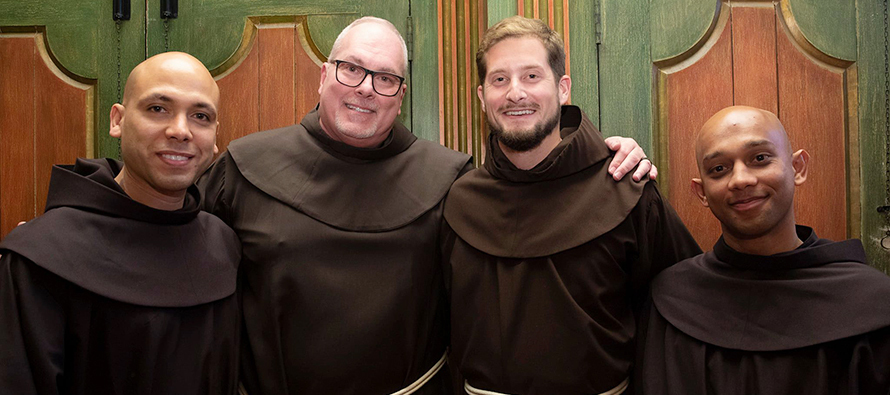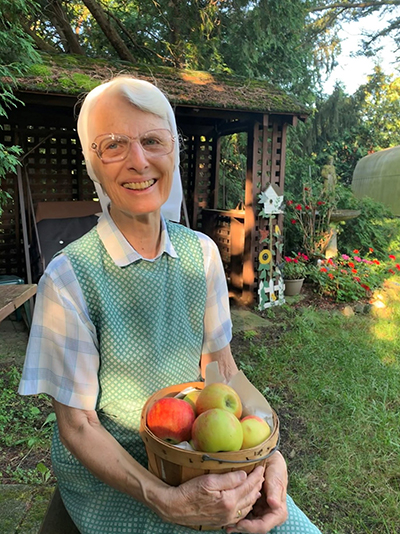Major traditions in religious life: Franciscan spirituality made simple

Community life is an important part of Franciscan spirituality. Pictured here are friars involved in novice formation, one of the preparation phases for those joining a religious order. (Photo courtesy of the Franciscan Friars, Holy Name Province.)
Who has not encountered a caricature of the great Italian saint, Francis of Assisi? His image can be found in churches and monasteries, yes, but also in plenty of stores in the form of cookie jars and bird baths. Even people who don’t practice any faith have some idea who he was.
For some he’s a lover of nature, someone who frolicked in fields and communed with the animals. For others he is a champion of the poor, someone who lived with lepers and denied his own needs. Still others see him as the people’s preacher, an excitable little man who spoke of the Gospel in simple terms to all who would listen.
In truth Saint Francis—and the spirituality he inspired—was all these things, and none of these things. He cared about the environment, the poor, and the mission of Christ, but at the heart of it all, he was simply a humble brother who desired to encounter Christ in all that he did.
Incarnational: Faith experienced in the real world
Sometimes people insist on drawing hard lines between “the sacred” (what is holy and spiritual) and “the profane” (everything else). Saint Francis was not one of them. Overwhelmed with the reality that the God of the entire universe had decided to take on flesh and become a part of creation, he could not help but see all of creation as the potential dwelling place of God. Jesus had become incarnate as a human being in a particular time and place, but God’s presence has never ceased revealing God to the world.

Franciscan spirituality is closely connected to the earth. Here Sister Grace Ellen Urban, O.S.F. holds apples gathered from trees on the property of her community, the Sisters of St. Francis of Sylvania, Ohio. Each year the sisters donate much of their apple harvest to a local soup kitchen. (Photo courtesy of the Sisters of St. Francis of Sylvania, OH.)
In his hymn, “Canticle of the Creatures,” Francis praises the Lord through elements of creation—the sun, moon, wind, weather, water, fire, and earth—for it is through these common aspects of nature that God’s presence is known. Even through the mundane and the lifeless, those with faith can see the glory of the incarnation: God chose to be a part of this, right here, all around me.
Francis’ spirituality is highly experiential, relying heavily on the senses and personal encounters. He did not forbid his brothers from studying books but far preferred that their faith be grounded in prayerful reflections on their immediate reality. Because of this emphasis he is said to have created the very first nativity scene, wanting not just abstract ideas about Christ’s birth, but to see, hear, smell, and feel what it must have been like for Christ to be born into the world.
For Francis, if Christ was poor, then the brothers were to do more than think about the poor or write treatises about Christ’s poverty. They were to experience poverty themselves. Similarly, if Christ traveled from town to town preaching, spent time in prayer, and cared for the sick, then the brothers were to do that as well.
The beauty of his spirituality is that it remains open to experiencing God today in every situation. If God is the creator and redeemer of all, then how could anything be profane? Francis’ joy springs from a sense that every moment is an opportunity to commune with a God who loves us.
Humble: Radical dependence on God
While many people characterize Saint Francis as a “poor” man, loving poverty and simplicity in all that he did, “poor” may not actually be the best word to capture his spirituality. Francis was undoubtedly poor and embraced an austere lifestyle, but this was not just a material situation; what mattered most to him was a relationship of humility before Christ.
In Francis’ Admonitions, documents he wrote to guide his religious order, the word “poverty” appears rarely in regard to physical assets. Rather, the idea of being “lesser,” “obedient,” “servant,” and “humble” resound in everything he says. As imitators of Christ, it is important to maintain a physically simple lifestyle, but this is useless if we are still arrogant, clinging to power, acting with violence, or relying on ourselves for success.
Incarnational
Jesus became “incarnate” or human, and likewise Franciscans emphasize experiencing God in the created world, especially nature.
Humble
Franciscans stress a rejection of the trappings of power and superiority, favoring a path to God through humility, poverty, and service.
Communal
A central part of Franciscan life is that it be lived in community, which forces members to bend, adapt, and learn to love those who are different.
Being a follower of Christ for Francis meant renouncing power over others, the need to be served, popular acclaim, safety, comfort, assurance, and anything else that could leave him depending on himself rather than God. Francis wanted his brothers to be the servants of all—even beggars and lepers—so that no one would feel superior or deserving in relationship to another. Inspired by Christ, who humbled himself before the disciples and washed their feet, Francis exhorted his brothers in leadership positions to remember they were servants. To this day leaders in Franciscan communities bear titles of servitude and humility, such as minister, custodian, and guardian.
Communal: Life together fosters faith
Intertwined with the Franciscan emphasis on the created world and on humility is the sense that Christian life is not to be lived in isolation. Francis’ spirituality is inherently communal. Rather than sending his brothers out on mission single-file, he always commissioned them in pairs. Communal prayer was never something to be dispensed with in order to do more ministry, but rather it was an essential part of life. Even so-called “private prayer” was never alone. In his Rule for Hermitages (guidance for brothers dedicated to personal prayer), the brothers were to take turns in contemplative prayer while the others took care of their physical needs.
For Francis community life was more than a utilitarian necessity; it was an essential part of living the Gospel humbly. While alone, we can be the rulers of our own lives, but this is not possible when living with others. In community we need to make compromises, overcome personality differences, and avert power struggles. Community is not simply a means of protection or correction from sin, but the very place where our call to humility and service is lived out.
For this reason some have called the Franciscan insistence on communal life inefficient. Given all of the work that needs to be done for the mission of Christ, why insist on living together in large groups or devoting time just to one another? Some argue it would be better to split up, that more work could be done. This might be the case, but for Francis work done this way would not be as effective. In the very act of living in community—learning to love those who are different, overcoming struggles, growing in humility—the Gospel is proclaimed.
In short Franciscan spirituality is about encounter. It is not about being an environmentalist, being poor, or even living with other people, although it may certainly include these things. Behind these external expressions rests a desire that pervades every Franciscan: a desire to encounter Christ in all things. That is what Francis sought more than anything else, and it is what Franciscans share today in their care for creation, love of the poor, and communal way of life.
Tags
Related
- Questions you’ll be glad you asked
- What monastic mystics got right about life
- Religious communities embrace diverse members
- How my parents responded when I became a brother
- Vocation Basics: You are already called—Message to youth from Pope Francis
- Meet the parents
- Charism: The gift that shapes lives
- What our vows mean
- Discover five treasures of religious life
- Religious making a difference Read More
Most Viewed
- Find your spirituality type quiz
- Questions and answers about religious vocations
- Celibacy quiz: Could I be a nun? Could I be a brother? Could I be a priest?
- Resources for older discerners or those with physical and developmental differences
- About Vocation Network and VISION Guide


